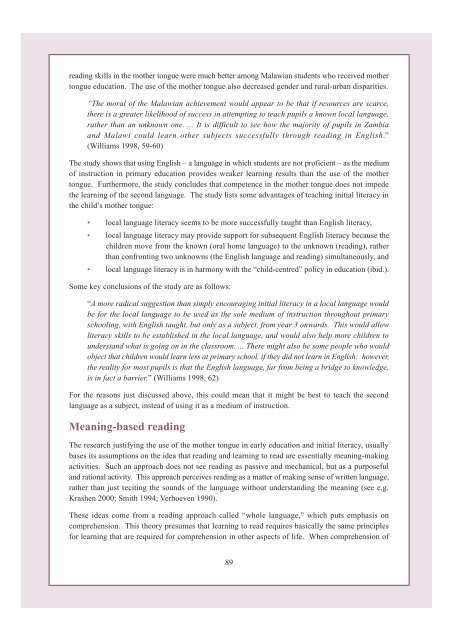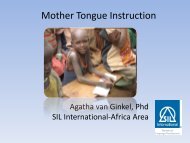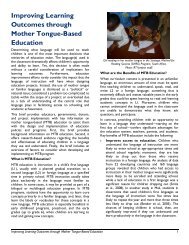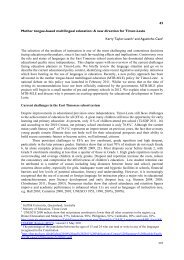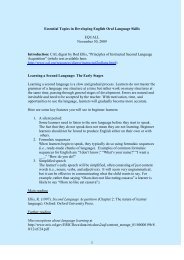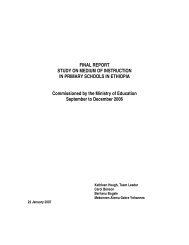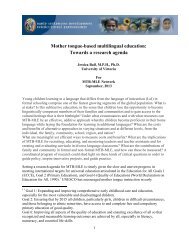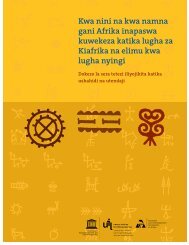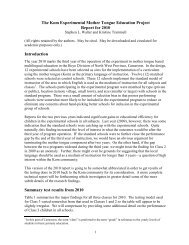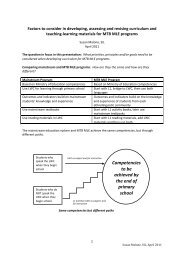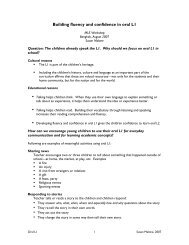Part I.pdf - MTB-MLE Network
Part I.pdf - MTB-MLE Network
Part I.pdf - MTB-MLE Network
Create successful ePaper yourself
Turn your PDF publications into a flip-book with our unique Google optimized e-Paper software.
eading skills in the mother tongue were much better among Malawian students who received mothertongue education. The use of the mother tongue also decreased gender and rural-urban disparities.“The moral of the Malawian achievement would appear to be that if resources are scarce,there is a greater likelihood of success in attempting to teach pupils a known local language,rather than an unknown one. ... It is difficult to see how the majority of pupils in Zambiaand Malawi could learn other subjects successfully through reading in English.”(Williams 1998, 59-60)The study shows that using English – a language in which students are not proficient – as the mediumof instruction in primary education provides weaker learning results than the use of the mothertongue. Furthermore, the study concludes that competence in the mother tongue does not impedethe learning of the second language. The study lists some advantages of teaching initial literacy inthe child’s mother tongue:• local language literacy seems to be more successfully taught than English literacy,• local language literacy may provide support for subsequent English literacy because thechildren move from the known (oral home language) to the unknown (reading), ratherthan confronting two unknowns (the English language and reading) simultaneously, and• local language literacy is in harmony with the “child-centred” policy in education (ibid.).Some key conclusions of the study are as follows:“A more radical suggestion than simply encouraging initial literacy in a local language wouldbe for the local language to be used as the sole medium of instruction throughout primaryschooling, with English taught, but only as a subject, from year 3 onwards. This would allowliteracy skills to be established in the local language, and would also help more children tounderstand what is going on in the classroom. ... There might also be some people who wouldobject that children would learn less at primary school, if they did not learn in English: however,the reality for most pupils is that the English language, far from being a bridge to knowledge,is in fact a barrier.” (Williams 1998, 62)For the reasons just discussed above, this could mean that it might be best to teach the secondlanguage as a subject, instead of using it as a medium of instruction.Meaning-based readingThe research justifying the use of the mother tongue in early education and initial literacy, usuallybases its assumptions on the idea that reading and learning to read are essentially meaning-makingactivities. Such an approach does not see reading as passive and mechanical, but as a purposefuland rational activity. This approach perceives reading as a matter of making sense of written language,rather than just reciting the sounds of the language without understanding the meaning (see e.g.Krashen 2000; Smith 1994; Verhoeven 1990).These ideas come from a reading approach called “whole language,” which puts emphasis oncomprehension. This theory presumes that learning to read requires basically the same principlesfor learning that are required for comprehension in other aspects of life. When comprehension of89


